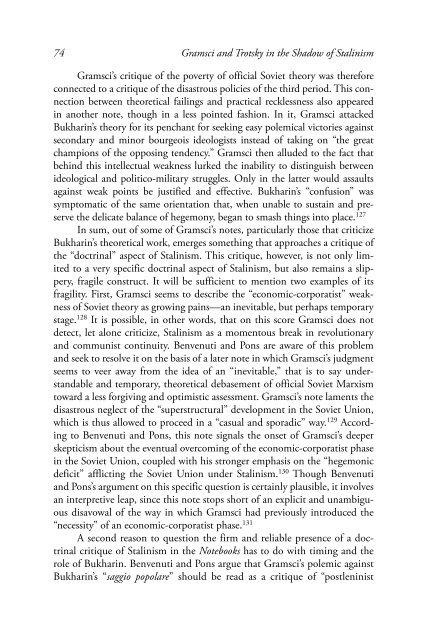Gramsci and Trotsky in the Shadow of Stalinism: The ... - Indymedia
Gramsci and Trotsky in the Shadow of Stalinism: The ... - Indymedia
Gramsci and Trotsky in the Shadow of Stalinism: The ... - Indymedia
- No tags were found...
You also want an ePaper? Increase the reach of your titles
YUMPU automatically turns print PDFs into web optimized ePapers that Google loves.
74 <strong>Gramsci</strong> <strong>and</strong> <strong>Trotsky</strong> <strong>in</strong> <strong>the</strong> <strong>Shadow</strong> <strong>of</strong> Stal<strong>in</strong>ism<strong>Gramsci</strong>’s critique <strong>of</strong> <strong>the</strong> poverty <strong>of</strong> <strong>of</strong>ficial Soviet <strong>the</strong>ory was <strong>the</strong>reforeconnected to a critique <strong>of</strong> <strong>the</strong> disastrous policies <strong>of</strong> <strong>the</strong> third period. This connectionbetween <strong>the</strong>oretical fail<strong>in</strong>gs <strong>and</strong> practical recklessness also appeared<strong>in</strong> ano<strong>the</strong>r note, though <strong>in</strong> a less po<strong>in</strong>ted fashion. In it, <strong>Gramsci</strong> attackedBukhar<strong>in</strong>’s <strong>the</strong>ory for its penchant for seek<strong>in</strong>g easy polemical victories aga<strong>in</strong>stsecondary <strong>and</strong> m<strong>in</strong>or bourgeois ideologists <strong>in</strong>stead <strong>of</strong> tak<strong>in</strong>g on “<strong>the</strong> greatchampions <strong>of</strong> <strong>the</strong> oppos<strong>in</strong>g tendency.” <strong>Gramsci</strong> <strong>the</strong>n alluded to <strong>the</strong> fact thatbeh<strong>in</strong>d this <strong>in</strong>tellectual weakness lurked <strong>the</strong> <strong>in</strong>ability to dist<strong>in</strong>guish betweenideological <strong>and</strong> politico-military struggles. Only <strong>in</strong> <strong>the</strong> latter would assaultsaga<strong>in</strong>st weak po<strong>in</strong>ts be justified <strong>and</strong> effective. Bukhar<strong>in</strong>’s “confusion” wassymptomatic <strong>of</strong> <strong>the</strong> same orientation that, when unable to susta<strong>in</strong> <strong>and</strong> preserve<strong>the</strong> delicate balance <strong>of</strong> hegemony, began to smash th<strong>in</strong>gs <strong>in</strong>to place. 127In sum, out <strong>of</strong> some <strong>of</strong> <strong>Gramsci</strong>’s notes, particularly those that criticizeBukhar<strong>in</strong>’s <strong>the</strong>oretical work, emerges someth<strong>in</strong>g that approaches a critique <strong>of</strong><strong>the</strong> “doctr<strong>in</strong>al” aspect <strong>of</strong> Stal<strong>in</strong>ism. This critique, however, is not only limitedto a very specific doctr<strong>in</strong>al aspect <strong>of</strong> Stal<strong>in</strong>ism, but also rema<strong>in</strong>s a slippery,fragile construct. It will be sufficient to mention two examples <strong>of</strong> itsfragility. First, <strong>Gramsci</strong> seems to describe <strong>the</strong> “economic-corporatist” weakness<strong>of</strong> Soviet <strong>the</strong>ory as grow<strong>in</strong>g pa<strong>in</strong>s—an <strong>in</strong>evitable, but perhaps temporarystage. 128 It is possible, <strong>in</strong> o<strong>the</strong>r words, that on this score <strong>Gramsci</strong> does notdetect, let alone criticize, Stal<strong>in</strong>ism as a momentous break <strong>in</strong> revolutionary<strong>and</strong> communist cont<strong>in</strong>uity. Benvenuti <strong>and</strong> Pons are aware <strong>of</strong> this problem<strong>and</strong> seek to resolve it on <strong>the</strong> basis <strong>of</strong> a later note <strong>in</strong> which <strong>Gramsci</strong>’s judgmentseems to veer away from <strong>the</strong> idea <strong>of</strong> an “<strong>in</strong>evitable,” that is to say underst<strong>and</strong>able<strong>and</strong> temporary, <strong>the</strong>oretical debasement <strong>of</strong> <strong>of</strong>ficial Soviet Marxismtoward a less forgiv<strong>in</strong>g <strong>and</strong> optimistic assessment. <strong>Gramsci</strong>’s note laments <strong>the</strong>disastrous neglect <strong>of</strong> <strong>the</strong> “superstructural” development <strong>in</strong> <strong>the</strong> Soviet Union,which is thus allowed to proceed <strong>in</strong> a “casual <strong>and</strong> sporadic” way. 129 Accord<strong>in</strong>gto Benvenuti <strong>and</strong> Pons, this note signals <strong>the</strong> onset <strong>of</strong> <strong>Gramsci</strong>’s deeperskepticism about <strong>the</strong> eventual overcom<strong>in</strong>g <strong>of</strong> <strong>the</strong> economic-corporatist phase<strong>in</strong> <strong>the</strong> Soviet Union, coupled with his stronger emphasis on <strong>the</strong> “hegemonicdeficit” afflict<strong>in</strong>g <strong>the</strong> Soviet Union under Stal<strong>in</strong>ism. 130 Though Benvenuti<strong>and</strong> Pons’s argument on this specific question is certa<strong>in</strong>ly plausible, it <strong>in</strong>volvesan <strong>in</strong>terpretive leap, s<strong>in</strong>ce this note stops short <strong>of</strong> an explicit <strong>and</strong> unambiguousdisavowal <strong>of</strong> <strong>the</strong> way <strong>in</strong> which <strong>Gramsci</strong> had previously <strong>in</strong>troduced <strong>the</strong>“necessity” <strong>of</strong> an economic-corporatist phase. 131A second reason to question <strong>the</strong> firm <strong>and</strong> reliable presence <strong>of</strong> a doctr<strong>in</strong>alcritique <strong>of</strong> Stal<strong>in</strong>ism <strong>in</strong> <strong>the</strong> Notebooks has to do with tim<strong>in</strong>g <strong>and</strong> <strong>the</strong>role <strong>of</strong> Bukhar<strong>in</strong>. Benvenuti <strong>and</strong> Pons argue that <strong>Gramsci</strong>’s polemic aga<strong>in</strong>stBukhar<strong>in</strong>’s “saggio popolare” should be read as a critique <strong>of</strong> “postlen<strong>in</strong>ist
















